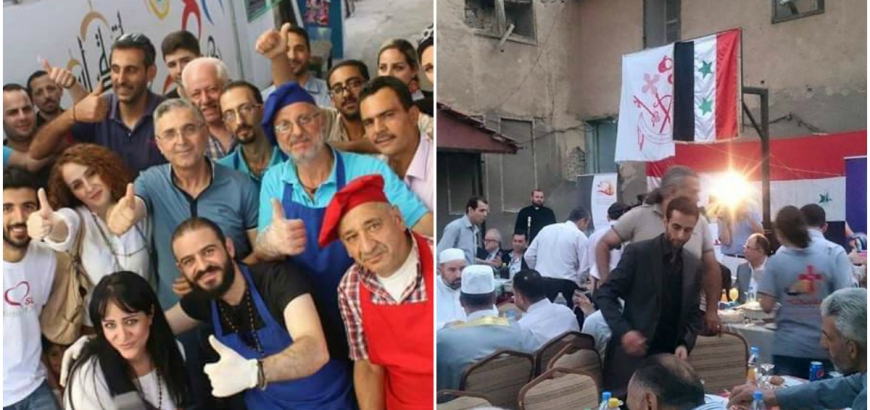Humanitarian initiatives have spread in regime areas during Ramadan to assist the poor and offer iftar (breaking fast) meals, with these programs receiving aid from both private businessmen and young volunteers who love to help.
Traditionally in Damascus — as with most provinces and cities in Syria — charitable actors, civil initiatives and aid groups organize collective iftar meals in the mosque squares and public gardens where passers-by and those who are stranded there can find things to remedy their hunger.
Among these initiatives is the “Help” kitchen initiative which is carried out by the Saed Charity Association in Ramadan, where a number of young people have recently volunteered to launch the “No to Hunger” program for the fifth year running.
The Assad government has tried to spread word of the Ramadan initiatives to encourage Damascus traders to donate during the holy month. But unbeknownst to those who donate, these initiatives are often an opportunity for widespread theft while exploiting emotions and sympathies.
With the crisis of displaced Syrians who have left their homes reaching 6.5 million people, they have been increasingly exploited and the aid offered to them, whether from traders or international organizations, has been stolen.
Large-scale thefts
Abdel Rizaq, the nickname chosen for himself by a young man in the Saed group, said that the initiative had received a lot of financial and in-kind assistance, but that no more than 15 percent of the materials it received had been handed out at the initiative's kitchen near the Umayyad Mosque.
According to information obtained by Alsouria Net, which corresponded with Abdel Rizaq’s stories, the Saed group before Ramadan obtained about 220 bags of rice, 356 bags of bulgar, about 2 tons of tomato paste and 300 kilograms of salt, in addition to material assistance received without financial access.
Abdel Karim (another nickname) from the Sakbat Initiative said: “About 3,000 iftar meals had reached 23 areas in Damascus completed with the efforts of about 40 volunteers divided between preparation, cooking, cooling and distribution. Everyone knows that the initiative received enough assistance to prepare about 22,000 meals.” This is according to a simple calculation made by his colleague in the initiative and an official in charge of receiving the aid from donors.
Intelligence agencies role
One of the volunteers of these campaigns, who asked not to be named, told Alsouria Net that these initiatives “Enjoy security cover from several security branches as they obtain the approval from the Political Security office.”
He added: “The director of one of the biggest Damascus initiatives is an employee in National Reconciliation Minister Ali Hayder's office, the broadcaster Reen al-Meela, which makes criticizing them very dangerous by the volunteers, even though the volunteers themselves are carefully selected and not indiscriminate and, as the name implies, are working voluntarily.”
This article was translated and edited by The Syrian Observer. Responsibility for the information and views set out in this article lies entirely with the author.


